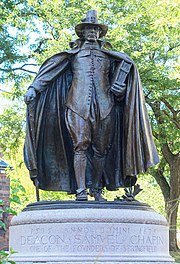| Part of a series on |
| Puritans |
|---|
 |
Impropriation, a term from English ecclesiastical law, was the destination of income from tithes of a church benefice to a layman.[1] With the establishment of the parish system in England, it was necessary for all church property and income to have a specific owner. This was the parochianus, parson, or rector who was sustained by the benefice income while providing personally for the cure of souls, the everyday pastoral and religious duties. The parson was technically a corporation sole.[n 1][2][3] Over the centuries, the benefice came to be considered a piece of property whose holder could discharge the spiritual responsibilities by a deputy, and many parishes were annexed by monasteries or other spiritual corporations, a process known as appropriation.[4] These ecclesiastical holders were bound to provide for a cleric known as a 'vicar' for the cure of souls, but could use any excess income as they pleased.[4]
Impropriation was similar except that the holder was a layman or secular corporation, again obliged to select and support a cleric to serve the parish. After 1200, no layman could have a cure of souls, but such grants were still occasionally made.[4] When the monastic properties passed into lay hands at the Reformation, many appropriations were converted to impropriations, and by 1603, of a total 9284 benefices, 3489 were held by impropriators or lay rectors.[5] By custom, they were obliged to maintain the chancel in good repair.[6]
- ^ Blunt, J.H. & Phillimore, Sir Walter G.F. The Book of Church Law Rivingtons(1885) p=340
- ^ Neep, E.J.C; Edinger, George. A Handbook of Church Law for the Clergy. A.R. Mowbray & Cº(1928) p.6
- ^ Blunt, J.H. & Phillimore, Sir Walter G.F. The Book of Church Law Rivingtons(1885) p=283
- ^ a b c Neep, E.J.C; Edinger, George. A Handbook of Church Law for the Clergy. A.R. Mowbray & Cº(1928) p.74
- ^ Dickens, A.G. The English Reformation Battsford (1999) p.364
- ^ Blunt, J.H. & Phillimore, Sir Walter G.F. The Book of Church Law Rivingtons(1885) p=340
Cite error: There are <ref group=n> tags on this page, but the references will not show without a {{reflist|group=n}} template (see the help page).
